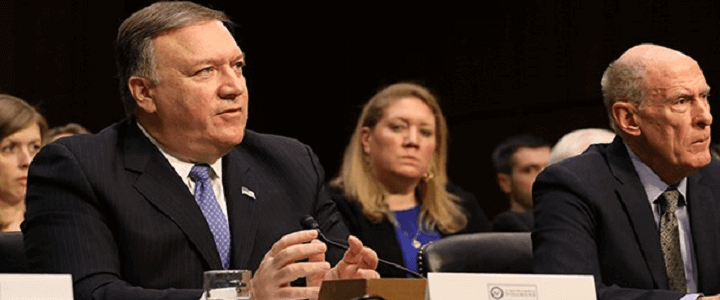I’ve been saying for the last six months that while the president’s words have meaning, they do not mean as much as what he and his team actually do. On Wednesday, Secretary of State Mike Pompeo and National Security Adviser John Bolton gave us two more examples. Both men further strengthened the case that the Trump Administration continues to take a hard line against Russia, despite the president’s bafflingly soft language in public.
Bolton announced late Wednesday that despite President Donald Trump’s desire to meet again with Russian President Vladimir Putin, this time at the White House, that meeting would not take place until next year. “The President believes that the next bilateral meeting with President Putin should take place after the Russia witch hunt is over,” he said, referring to the investigation of Special Counsel Robert Mueller, “so we’ve agreed that it will be after the first of the year.”
To review just some of the other steps the administration has taken in the past 18 months…
- Officially labeled Russia a “revisionist power” in the National Security Strategy. The NSS also called-out Russia for its use of “information tools in an attempt to undermine the legitimacy of democracies,” a clear reference to the events around the 2016 election.
- Declared in the National Defense Strategy that “Long-term strategic competitions with China and Russia are the principal priorities” for DOD, “because of the magnitude of the threats they pose to U.S. security and prosperity today, and the potential for those threats to increase in the future.”
- Approved the long-available but unused authority to provide lethal military aid to Ukraine, and sanctioned more than 100 Russian companies and individuals for their roles in the illegal occupation of Crimea.
- Engaged Russian mercenaries in direct combat in Syria.
- Closed Russian consulates and expelled 60 diplomats in response to the attempted assassination-by-nerve-agent of former Russian spy Sergei Skripal.
- Publicly warned our European allies of the dangers of relying on Russia’s Nord Stream 2 natural gas pipeline.
Pompeo says “Nyet” to CRIMEA Annexation
Pompeo sat through an often contentious three-hour hearing before the Senate Foreign Relations Committee, his first such appearance since his confirmation. In one particularly testy exchange with New Jersey Sen. Bob Menendez, the senior Democrat on the committee, Pompeo himself made the same point I’m making here. Menendez asked if Trump discussed “relaxing” of sanctions with Russia’s Vladimir Putin. “Senator, the U.S. policy with respect to sanctions remains completely unchanged,” Pompeo answered.
Menendez pressed further, demanding to know if Pompeo’s answer was a declaration that the president had not in fact had that discussion. “Presidents are entitled to have private meetings. I’m telling you what U.S. policy is.”
As heated as that that exchange was, the true policy fireworks came in Pompeo’s opening statement. Evoking the memory of a former acting secretary of state, Sumner Welles, Pompeo planted a flag in the ground over Crimea.
“I want to assure this Committee that the United States does not, and will not, recognize the Kremlin’s purported annexation of Crimea,” he declared. “We stand together with allies, partners, and the international community in our commitment to Ukraine and its territorial integrity. There will be no relief of Crimea-related sanctions until Russia returns control of the Crimean peninsula to Ukraine. To this end, today we are formalizing United States policy of non-recognition by releasing a Crimea Declaration.”
A Welles Declaration for the 21st Century
Conservative policy wonks like Luke Coffey at the Heritage Foundation have urged the U.S. government to issue this exact declaration for more than a year. Welles set the historical precedent for such a declaration in 1940.
On June 15, 1940, the Soviet Union invaded and quickly annexed Latvia, Lithuania, and Estonia; three countries on the Baltic Sea. The trio had formerly been part of the Russian Empire, but declared their independence following the 1917 revolutions in Russia. Although President Woodrow Wilson favored keeping the Baltic states incorporated into Russia, his successor, Warren Harding, extended full diplomatic recognition to the three nations on July 25, 1922.
In reaction to the Soviet aggression, Welles, a Groton- and Harvard-educated diplomat (whose Groton roommate was Eleanor Roosevelt’s younger brother) issued a stunning declaration on July 23.
“The policy of this government is well known,” the statement read. “The people of the United States are opposed to predatory activities no matter whether they are carried on by the use of force or the threat of force. They are likewise opposed to any form of intervention on the part of one state, however powerful, in the domestic concerns of any other sovereign state, however weak.”
The “Welles Declaration” began a U.S. policy of “non-recognition” of Soviet control of the Baltics that, although further refined, lasted until 1975. Those three countries, captives of the Soviet Union for 50 years, are now fully integrated into NATO, along with all the other Warsaw Pact Soviet satellite states.
I only pray it won’t take 50 years for Crimea to return to Ukraine.




